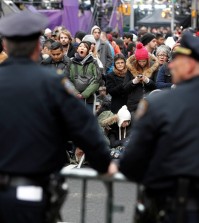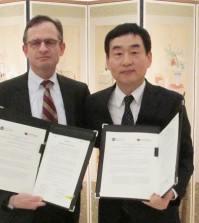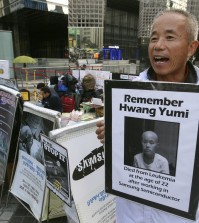- California Assembly OKs highest minimum wage in nation
- S. Korea unveils first graphic cigarette warnings
- US joins with South Korea, Japan in bid to deter North Korea
- LPGA golfer Chun In-gee finally back in action
- S. Korea won’t be top seed in final World Cup qualification round
- US men’s soccer misses 2nd straight Olympics
- US back on track in qualifying with 4-0 win over Guatemala
- High-intensity workout injuries spawn cottage industry
- CDC expands range of Zika mosquitoes into parts of Northeast
- Who knew? ‘The Walking Dead’ is helping families connect
Flushing bridge near Koreatown to re-open construction after 5-year closing

New York Senator Toby Ann Stavisky announced Thursday that construction would begin this month on a 149th Street bridge that has been closed since 2010.
By The Korea Times New York staff
A closed bridge near the Flushing food alley that has driven area business owners to file a class-action lawsuit against the construction company overseeing repairs will re-open next year, at the latest by June.
The bridge, located at 149th Street near Koreatown, runs over a Long Island Rail Road heading into Manhattan. Local business owners, the majority of them Korean, have blamed its closing in 2010 for severe sales damages and an uncommonly high business turnover rate.
State Senators Toby Ann Stavisky and City Councilman Peter Koo announced Thursday that the city’s Department of Transportation has chosen a new construction company, Perfetto, which will begin repairs at the end of this month.
Plans for the bridge include creating a new foundation and the addition of two-hour metered parking spaces.
The alley houses one of New York City’s highest concentrations of Korean-owned businesses.
After its initial closing in 2010, the bridge was re-opened in 2012 after maintenance but found to have cracks and a faulty design by city inspectors. Another lawsuit is still ongoing between the City of New York and Gandhi Engineering, the construction company.
In July, the Wall Street Journal reported that area businesses had taken a 30 percent hit in annual revenue since 2009, much of it attributed to the closing of the bridge.
Last month, the local merchants association gathered to declare the class-action lawsuit, asking for other affected area business owners to join them in seeking compensation from the construction company for damages.
They had the support of Stavisky, Koo and State Senator Ron Kim.
“Regardless of construction finally starting on the bridge, the class-action lawsuit for damages suffered during its closing will continue,” said Ryu Jae-bong, president of the Korean American Association of Queens.















